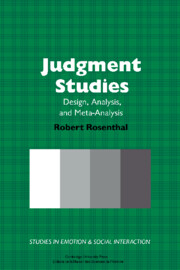
-
Select format
-
- Publisher:
- Cambridge University Press
- Publication date:
- 06 November 2009
- 29 May 1987
- ISBN:
- 9780511527807
- 9780521331913
- 9780521101479
- Dimensions:
- (228 x 152 mm)
- Weight & Pages:
- 0.5kg, 268 Pages
- Dimensions:
- (229 x 152 mm)
- Weight & Pages:
- 0.4kg, 268 Pages
You may already have access via personal or institutional login- Subjects:
- Economics, Social Psychology, Economics: General Interest, Psychology, Cognition
Book description
Because of the complexity of human behaviour a great many research variables must be constructed from the building blocks of human judgement. A teacher's warmth, a psychotherapist's ability to create rapport, a patient's inner state - these all tend ultimately to be defined by the judgements of others. The purpose of this book is to describe the design, the analysis and the meta-analysis of studies employing judgements in sufficient detail that readers can conduct such studies, and more wisely evaluate them. While the author's examples are drawn primarily from research on non-verbal behaviour, the book is designed for any investigators employing judges, observers, raters, coders, or decoders, whether or not the behaviour being assessed is non-verbal. Judgment Studies: Design, Analysis, and Meta-Analysis constitutes a unique resource for advanced students and researchers in the behavioural and social sciences. It offers the first integrated summary of methodological issues in judgement studies, and the first guide to their planning and analysis.
Reviews
"...invites the interest of any who would evaluate judgment studies or learn to conduct them...a valuable source of guidance..." Contemporary Psychology
"...consistently clear and characterized by admirable good sense." Contemporary Sociology
Contents
Metrics
Full text views
Full text views help Loading metrics...
Loading metrics...
* Views captured on Cambridge Core between #date#. This data will be updated every 24 hours.
Usage data cannot currently be displayed.
Accessibility standard: Unknown
Why this information is here
This section outlines the accessibility features of this content - including support for screen readers, full keyboard navigation and high-contrast display options. This may not be relevant for you.
Accessibility Information
Accessibility compliance for the PDF of this book is currently unknown and may be updated in the future.


